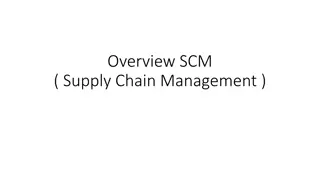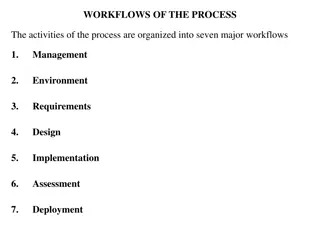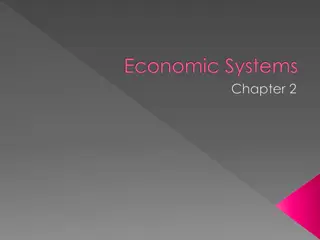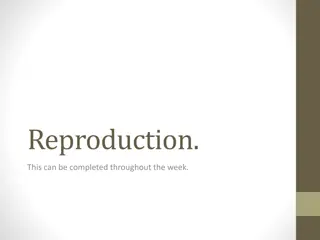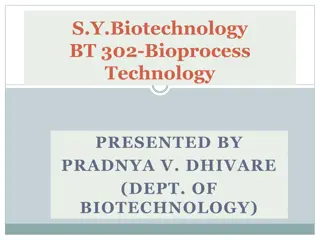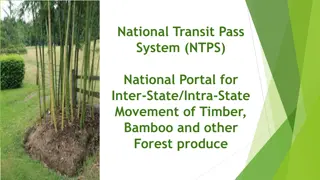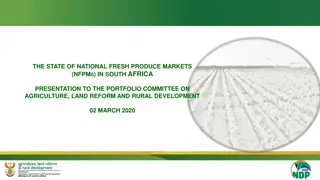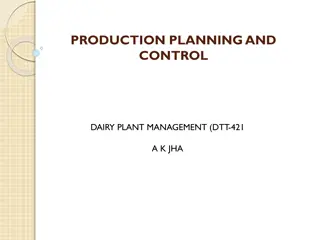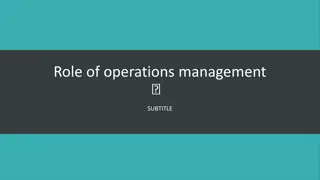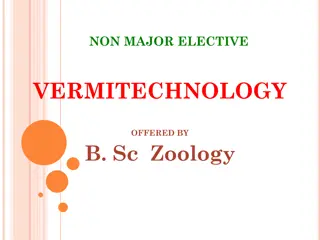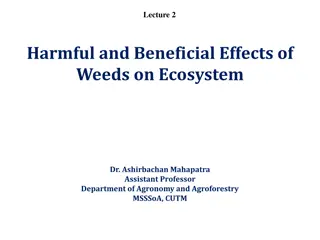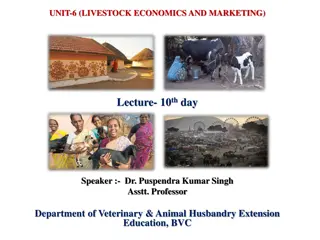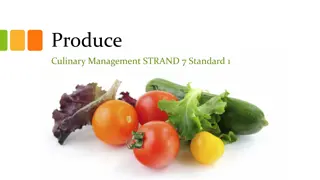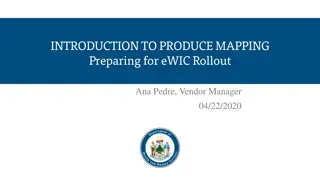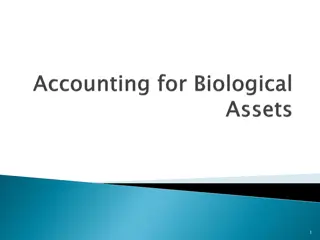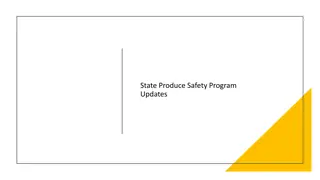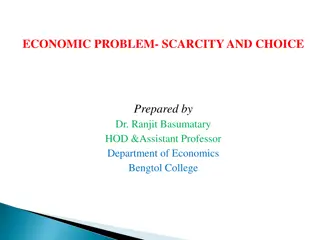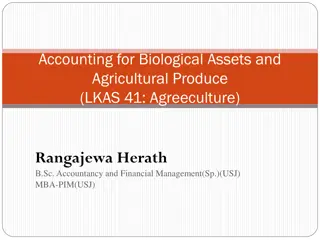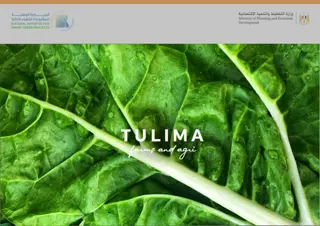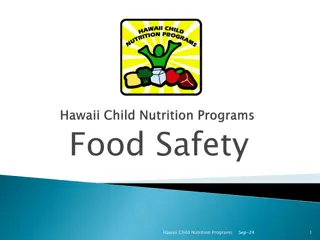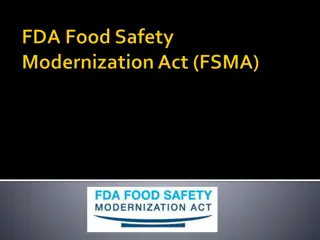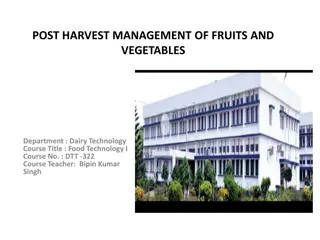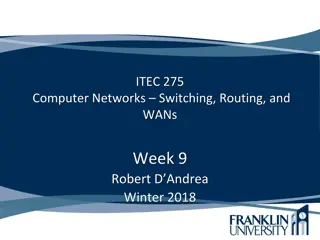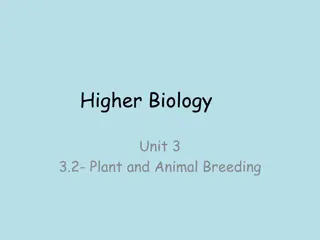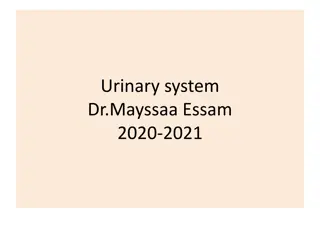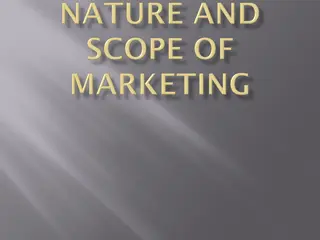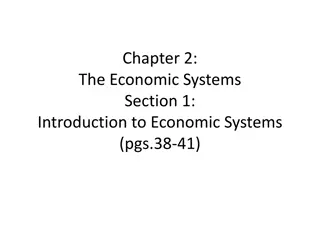FACILITY MANAGEMENT & SAFETY
Facility management and safety are interlinked disciplines crucial for optimizing workflow and ensuring a safe environment in various facilities. This includes managing space, infrastructure, resources, and staff effectively. Specific focus on laboratory facility management involves maintaining qual
3 views • 19 slides
Understanding Supply Chain Management (SCM) in Business
Supply Chain Management (SCM) involves a network of companies collaborating to produce and deliver products or services to end consumers. It comprises elements such as suppliers, manufacturers, warehouses, distribution centers, transportation systems, retail outlets, and customers. SCM aims to enhan
2 views • 15 slides
adonai software
Adonai college Management System is a cloud-based ERP System that delivers various College and School Management Systems, College and School Management Software, College and School Management System ERP, College and School Management Software System, Online College and School Management Software Sys
3 views • 1 slides
National Radioactive Waste Management Plan Overview
Briefing the Select Committee on Land Reform, Environment, Mineral Resources, and Energy about the South African Radioactive Waste Management Programme and the legislative background governing radioactive waste management. The presentation outlines the framework, guiding elements, waste management p
4 views • 19 slides
Chronic Myeloid Leukemia
Chronic myeloid leukemia (CML), or chronic myelogenous leukemia, is a slow-growing form of cancer that affects the bone marrow and blood. Like acute myeloid leukemia, CML originates in the myeloid cells. When functioning properly, myeloid cells produce mature red blood cells, platelets and non-lymph
2 views • 7 slides
Comprehensive Property Management Services in Waterbury, CT by Idoni Management
Explore the comprehensive property management services offered by Idoni Management in Waterbury, CT. Our expert team provides tailored solutions for property owners, including tenant screening, rent collection, property maintenance, financial reporting, and lease management. Discover why we are the
1 views • 10 slides
Software Process Workflows and Management Overview
This content discusses the organization of activities into seven major workflows in the software development process, including Management, Environment, Requirements, Design, Implementation, Assessment, and Deployment. It highlights how these workflows are performed concurrently with varying effort
1 views • 72 slides
Introduction to Organizational Behavior: Management Theories and Practices
Explore the evolution of organizational behavior from early management theories to contemporary practices. Understand the historical foundations and relevance of management theory in shaping workplace dynamics. Delve into key concepts like Scientific Management, Administrative Management, Bureaucrat
1 views • 28 slides
Understanding Economic Systems: Chapter 2 Overview
All societies have economic systems to provide for the wants and needs of their people. An economic system functions to produce and distribute goods and services to consumers. The key economic questions involve what goods/services to produce, how to produce them, and who will consume them. Society's
0 views • 35 slides
Understanding Reproduction: Pollen, Eggs, and Life Cycles in Plants
Reproduction in plants involves the transfer of pollen to eggs, leading to fertilization and the formation of new life. Male animals produce sperm, while females produce eggs, which fertilize when they meet. Different animals exhibit external or internal fertilization, with varying numbers of offspr
1 views • 13 slides
Understanding Bioprocess Technology and its Applications
Bioprocess technology involves utilizing living cells or their components like bacteria and enzymes to produce desired products through fermentation. This field covers a range of processes, including microbial bioprocesses, enzyme production, metabolite synthesis, recombinant products, and transform
0 views • 15 slides
National Transit Pass System (NTPS) for Forest Produce Transportation
The National Transit Pass System (NTPS) is a digital platform designed to streamline the issuance and monitoring of transit permits for the transportation of timber, bamboo, and other forest produce across states. It aims to replace manual processes, enhance transparency, and facilitate agro-forestr
0 views • 14 slides
The State of National Fresh Produce Markets in South Africa
Presentation to the Portfolio Committee on Agriculture, Land Reform, and Rural Development, highlighting the importance of National Fresh Produce Markets (NFPMs) in South Africa. The presentation covers the challenges, recommendations, and key details such as the number of NFPMs operating, turnover,
0 views • 15 slides
Understanding Economic Systems and Basic Questions
Economic systems are the foundation of societies, organizing production and distribution of goods. Three basic questions drive economic systems: what goods to produce, how to produce them, and for whom. Traditional, command, and market economies each address these questions differently, relying on c
1 views • 11 slides
Introduction to Production Planning and Control in Dairy Plant Management
Production planning and control in dairy plant management involve the strategic processes of production, planning, and control to ensure efficient manufacturing operations. Planning is crucial in determining what, how, how much, and where to produce, while control involves monitoring and adjusting p
2 views • 22 slides
Understanding the Strategic Role of Operations Management
The strategic role of operations management involves cost leadership, good/service differentiation, and interdependence with other key business functions. Operations management coordinates activities to add value by producing outputs valued by consumers. The operations department acquires inputs and
0 views • 23 slides
Powers to Summon Persons and Produce Documents under GST and Central Excise Acts
The content discusses the power of the proper officer under the Goods and Services Tax (GST) Act and the Central Excise Act to summon individuals to provide evidence and produce documents for inquiries. It also highlights the judicial significance of such inquiries and the obligations of individuals
0 views • 18 slides
Vermitechnology and Composting: Sustainable Waste Management Solutions
Solid waste management is crucial in the face of increasing urbanization. Composting and vermitechnology offer natural and effective ways to treat organic waste, with earthworms playing a key role in bioconversion processes. Utilizing organic wastes like animal manure, crop residues, and food waste,
1 views • 12 slides
Impact of Weeds on Agriculture: Harmful Effects and Consequences
Weeds have detrimental effects on agriculture by competing for resources, reducing crop yields, complicating management practices, and diminishing crop quality. The direct and indirect consequences of weed infestations include economic losses, laborious field maintenance, lower quality produce, and
0 views • 12 slides
Understanding Production Decision Making in Livestock Economics and Marketing
Dr. Puspendra Kumar Singh discusses the Theory of Production in livestock economics, covering topics such as how much to produce, how to produce, and what to produce. He explains the factors affecting production decisions, including input-output relationships and different types of production functi
1 views • 17 slides
The Palm - A Superlative Brand of Hospitality
The Palm, established in 2014, aims to offer exceptional sleeping, relaxing, working, dining, and drinking experiences. With elegantly designed bedrooms, locally sourced produce, dedicated spaces, and an environmentally conscious approach, The Palm sets itself apart. Access to exclusive resident-onl
2 views • 5 slides
Effective Produce Management in Culinary Practice
Understand the importance of quality produce, considerations for purchasing fruits, proper storage techniques, washing produce, preventing enzymatic browning, and cooking using both dry and moist heat methods.
0 views • 10 slides
Understanding Economic Systems and Questions
Explore the concepts of traditional, command, and market economies, and how they answer key economic questions. Learn about economic systems in Canada, Cuba, and Brazil, and grasp the fundamental economic questions of what to produce, how to produce, and for whom to produce. Understand the basics of
0 views • 26 slides
Maine eWIC Rollout: Introduction to Produce Mapping
Prepare for the eWIC rollout in Maine by understanding the importance of produce mapping, submitting UPCs for approval, and ensuring items are on the approved product list. Learn how eWIC streamlines transactions and offers flexibility to participants.
0 views • 12 slides
Accounting for Biological Assets and Agricultural Produce
At the end of this lesson, you will be able to identify the principal issues in accounting for biological assets and agricultural produce at the time of harvest. Topics include the recognition, measurement, presentation, and disclosure of biological assets in financial statements. Questions regardin
0 views • 26 slides
State Produce Safety Program Updates in Various Jurisdictions
Updates on state produce safety programs in Massachusetts, Maryland, New Hampshire, and Rhode Island. Includes details on educational partners, funding, inspections, challenges faced, upcoming initiatives, and support programs.
0 views • 13 slides
Understanding the Economic Problem: Scarcity and Choice
The economic problem arises from the scarcity of resources relative to unlimited wants, leading to the necessity of making choices. This results in the central questions of what to produce, how to produce, and for whom to produce, which are inherent in every economy. Decision-making processes involv
0 views • 7 slides
Accounting for Biological Assets and Agricultural Produce (LKAS 41: Agriculture) by Rangajewa Herath
This content provides insights into the accounting standards for biological assets and agricultural produce under LKAS 41, discussing classification, presentation, measurement, gain or loss recognition, and disclosure requirements. It covers the unique nature of biological assets, the scope of LKAS
0 views • 20 slides
Transforming Tulima Profile A 20 Feddan Farm into a High-Yielding, Climate-Positive Pilot Farm
Tulima Profile A 20 Feddan farm in El Beheira is pioneering high-tech, precise, and environmentally friendly agriculture practices. By leveraging hydroponic techniques and cutting-edge farming methods in state-of-the-art greenhouses, Tulima produces delicious, pesticide-free produce year-round with
0 views • 6 slides
Promoting Health and Wellness Through Access to Fresh Produce
Empower communities to make healthier choices by increasing access to fresh produce. Addressing obesity rates in Alabama, the initiative focuses on educating, providing resources, and bridging food insecurity gaps. By supporting local agencies and food banks, encouraging healthy lifestyles, and prom
0 views • 13 slides
Ensuring Food Safety in Hawaii Child Nutrition Programs
Food safety practices and guidelines are essential in Hawaii Child Nutrition Programs to prevent diseases like Rat Lungworm. Measures include thorough inspection and rinsing of produce, compliance with regulations for washing produce, and following protocols such as HACCP principles. Regular monitor
0 views • 25 slides
Agricultural Water Safety Regulations Overview
The final Produce Rule and Preventive Controls Rule, effective since November 13, 2015, set criteria for microbial contamination in agricultural water. Generic E. coli levels are key indicators, affecting water uses in post-harvest and production. Criteria like Geometric Mean and Statistical Thresho
0 views • 43 slides
Risk Management & MPTF Portfolio Analysis at Programme Level for UN Somalia
This session delves into the world of risk management and portfolio analysis at the programme/project level, specifically focusing on the Risk Management Unit of the United Nations Somalia. It covers enterprise risk management standards, planned risk management actions, the role of RMU, joint risk m
0 views • 30 slides
Post Harvest Management of Fruits and Vegetables in Food Technology Course
Post Harvest Management of Fruits and Vegetables is crucial to reduce wastage during transportation and storage. This course covers harvesting techniques, maturity indices, and methods for determining harvesting maturity in fruits and vegetables. Emphasis is placed on ensuring the produce reaches co
0 views • 12 slides
Understanding Network Management Processes in Computer Networks
Network management processes play a vital role in maintaining the efficiency and security of computer networks. This includes fault management, configuration management, accounting management, performance management, and security management. Syslog, a standard for computer message logging, is utiliz
0 views • 78 slides
Understanding Dry Eye: Causes, Symptoms, and Diagnosis
Dry eye is a common condition that occurs when your eyes do not produce enough tears or produce tears with the improper chemical composition. This can result from various factors such as aging, hormonal changes, medications, and environmental irritants. Symptoms include stinging, gritty sensation, f
0 views • 13 slides
Understanding Plant and Animal Breeding Techniques
Selective breeding is a key technique used by breeders to manipulate an organism's heredity in order to obtain desirable characteristics in crop plants and livestock. This process aims to produce new and improved cultivars or breeds that are beneficial to humans. Through heritable characteristics su
0 views • 27 slides
Overview of the Urinary System and Kidney Function
The urinary system, also known as the renal system, includes the kidneys, ureters, bladder, and urethra. Its main functions are waste elimination, blood volume regulation, electrolyte control, and pH regulation. The kidneys, bean-shaped organs with a complex structure, filter blood to produce urine.
0 views • 35 slides
Understanding the Nature of Marketing Management
Marketing management combines the fields of marketing and management, focusing on identifying consumer needs, creating products, setting prices, managing distribution, and promoting goods/services. It involves activities such as planning, organizing, staffing, directing, and controlling to achieve b
0 views • 20 slides
Understanding Different Economic Systems
Introduction to economic systems reveals how societies address scarcity by determining what to produce, how to produce, and for whom. Traditional, command, market, and mixed economies are explored, highlighting their distinct approaches. Traditional economies rely on customs, command economies are g
0 views • 9 slides

